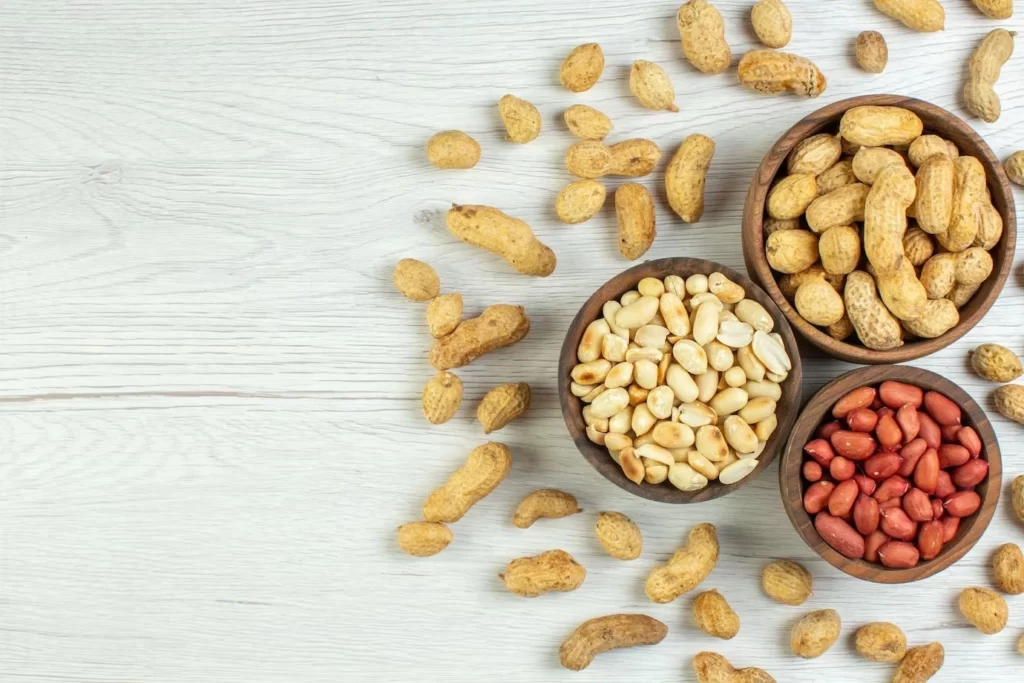
Introduction – Benefits of Peanut
Peanuts, also known as groundnuts, are a popular legume widely consumed around the world. They are packed with nutrients and are a great source of plant-based protein. Peanuts are a versatile food that can be eaten raw, roasted, or ground into butter or oil. In this article, we will explore the many benefits of peanut and how they can contribute to a healthy and balanced diet.
Nutritional Content of Peanut
Peanuts are loaded with essential vitamins and minerals that are vital for our health. Here is a breakdown of the nutritional content of peanuts:
Macronutrients
- Protein: Peanuts are an excellent source of plant-based protein, with 25 grams of protein per 100 grams of peanuts.
- Fat: Although peanuts are high in fat, they are a good source of healthy monounsaturated and polyunsaturated fats.
- Carbohydrates: Peanuts are low in carbohydrates, with only 16 grams per 100 grams of peanuts.
Micronutrients
- Vitamins: Peanuts are a good source of vitamins B3, B6, and E.
- Minerals: Peanuts are high in magnesium, phosphorus, and potassium.
Health Benefits of Peanut
1. Promotes Heart Health
Consuming peanuts regularly has been linked to a lower risk of heart disease. The high levels of healthy fats in peanuts can help lower LDL cholesterol levels and reduce inflammation in the body.
2. Helps with Weight Management
Despite being high in fat and calories, peanuts can actually aid in weight loss. The protein and fiber in peanuts can help you feel full for longer, which can reduce overall calorie intake.
3. Boosts Energy Levels
Peanuts are an excellent source of energy, thanks to their high protein and healthy fat content. Eating peanuts as a snack can provide a sustained energy boost without causing a spike in blood sugar levels.
4. Improves Brain Function
Peanuts contain high levels of niacin, which is essential for brain function. Consuming peanuts regularly has been shown to improve cognitive function and reduce the risk of age-related cognitive decline.
5. Reduces Inflammation
The healthy fats in peanuts can help reduce inflammation in the body. Chronic inflammation is linked to many health issues, including heart disease, cancer, and diabetes.
How to Incorporate Peanuts into Your Diet?

There are many delicious ways to incorporate peanuts into your diet:
- Snack on raw or roasted peanuts
- Make your own peanut butter or use it as a spread
- Add peanuts to salads, stir-fries, or curries for added crunch and flavor
- Make peanut sauce for dipping or as a marinade
- Bake with peanut flour or add it to smoothies for added protein
Conclusion
Peanuts are a nutritious and versatile food that can provide many health benefits. They are a great source of plant-based protein and healthy fats, and can help reduce the risk of heart disease, aid in weight management, and improve brain function. Adding peanuts to your diet is a great way to promote overall health and wellbeing.
FAQs
1.What are some health benefits of peanuts?
Peanuts are rich in protein, healthy fats, fiber, vitamins, and minerals, making them a great addition to a healthy diet. Some health benefits of peanuts include improved heart health, lower risk of type 2 diabetes, improved digestion, and reduced inflammation.
2.How many peanuts should I eat in a day?
It is recommended to consume peanuts in moderation due to their high calorie and fat content. A serving size of peanuts is approximately 1 ounce or about a handful. Consuming 1-2 servings of peanuts per day can provide health benefits without adding too many extra calories to your diet.
3.Are roasted peanuts as healthy as raw?
Roasted peanuts are still healthy but may have slightly fewer nutrients than raw peanuts due to the roasting process. However, roasted peanuts may also be higher in sodium and other added ingredients, such as oils or flavorings, which can decrease their overall health benefits.
4.Can peanuts cause allergies?
Yes, peanuts are a common allergen and can cause severe allergic reactions in some individuals. It is important for those with peanut allergies to avoid consuming peanuts and to be cautious when consuming foods that may contain peanuts or peanut products.
5.Can peanuts help with weight loss?
While peanuts are high in calories and fat, they can still be a part of a healthy weight loss diet when consumed in moderation. Peanuts are high in protein and fiber, which can help keep you feeling full and satisfied, leading to less overeating and potential weight loss.
LIKE WHAT YOU’RE READING?
CHECK OUT SOME OF OUR OTHER GREAT CONTENT HERE:
- HOW TO MAINTAIN HEALTHY LIFESTYLE?
- 10 TIPS ON HEALTHY LIFESTYLE
- BEST MOTIVATIONAL QUOTE FOR SUCCESS IN LIFE
- HOW TO REDUCE FUEL CONSUMPTION?
- LEARN THE ART OF TIME MANAGEMENT
- DEVELOPING EMOTIONAL INTELLIGENCE
- LEARN PROBLEM SOLVING SKILLS
- BEST BOOKS ABOUT SWAMI VIVEKANANDA
- 20 BEST QUOTES FOR A HEALTHY LIFESTYLE
- WHAT ARE BENEFITS OF RUNNING?
- WHAT ARE THE BENEFITS OF GREEN TEA?
- BENEFITS OF FENUGREEK FOR WOMEN: A COMPREHENSIVE GUIDE



